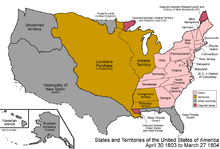This article needs additional citations for verification .(February 2018) |

This section of the timeline of United States history concerns events from 1790 to 1819.
This article needs additional citations for verification .(February 2018) |

This section of the timeline of United States history concerns events from 1790 to 1819.

